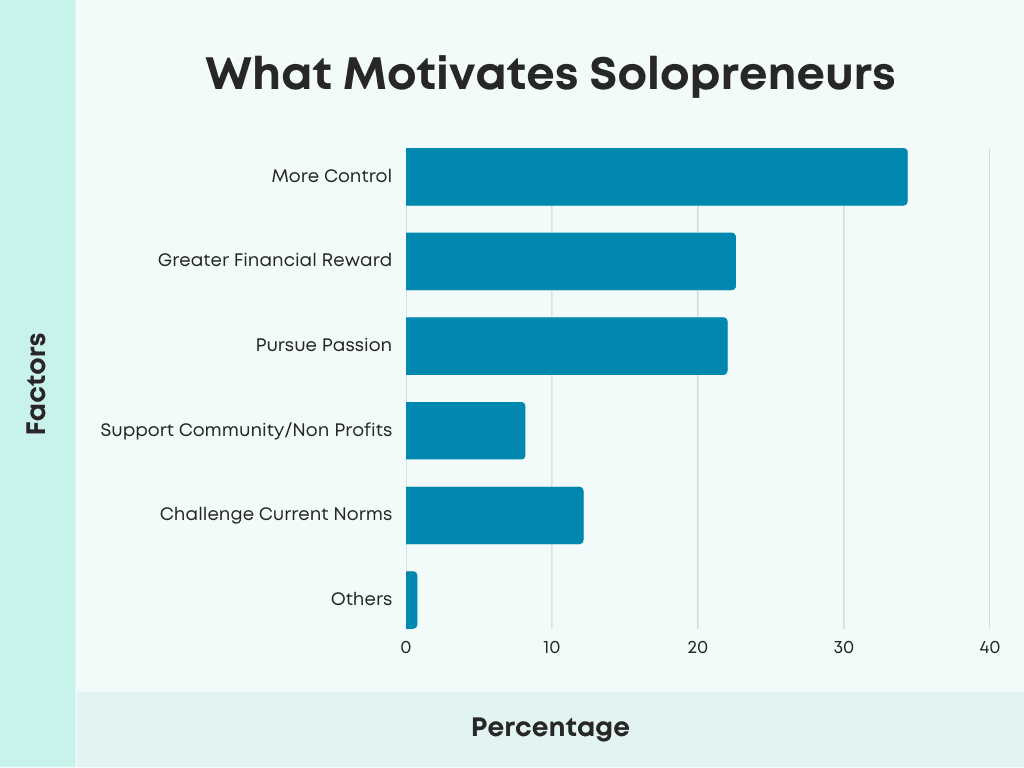
What is a Solopreneur? (Examples + How to Become One)
A solopreneur, to put it simply, is a one-person show.
It’s someone who runs a business single-handedly, without the support of any employees. Imagine wearing all the hats in a business – from the CEO to the office accountant. That’s a solopreneur for you.
Despite handling most tasks alone, solopreneurs often need to contract help to manage certain aspects of their business. This could be for projects that demand specialized skills or during peak business periods when the workload is too intensive for one person.
For instance, they might hire a freelance graphic designer for branding or a tax consultant during the tax season. However, even in such scenarios, the solopreneur is responsible for the company’s success or failure.
What are Examples of Solopreneurs?
Content creators, coaches, and affiliate marketers are all examples of solopreneurs.
Let’s make this concept clearer.
Imagine an affiliate marketer who manages multiple partnerships, generates passive income, and strategizes marketing campaigns.
Picture a course creator who creates online learning experiences, from content creation to student engagement.
Visualize a coach who guides individuals to achieve their goals, providing valuable insights and support.
And, of course, the photographer who captures magical moments, manages bookings, editing, and marketing.
They’re all solopreneurs.
What is the Difference Between an Entrepreneur and a Solopreneur?
So, you might wonder, “Aren’t entrepreneurs and solopreneurs the same thing?”
Well, not quite.
Entrepreneurs often have bigger goals, aiming for growth and expansion. They’re ready to build a team, delegate tasks, and in many cases, work towards exiting the business.
Solopreneurs, on the other hand, prefer to keep things small and manageable. They value the control and flexibility that come with flying solo.
According to data from LeapMesh,
The primary motivators for solopreneurs include the desire to have more control over their lives (34.35%), to have a greater financial reward (22.58%) and to do something they are passionate about (22.01%).

What Is the Difference Between a Freelancer and a Solopreneur?
Now, if you’re thinking, “Then, isn’t a solopreneur just a fancy term for a freelancer?”
While both work independently, freelancers are often seen as part of the gig economy, taking on projects and moving on when they’re done.
Solopreneurs, however, own a business and think long-term. They’re not just doing a gig. They’re building an empire, one brick at a time.
What Is the Difference Between a Sole Proprietor and a Solopreneur?
Okay, last comparison— sole proprietor and a solopreneur. A sole proprietor is a business ownership structure where one person owns and runs the business. It’s more about legalities and less about business strategy. Solopreneurs could be sole proprietors but could also set up their businesses as a corporation or an LLC.
How Do I Become a Solopreneur?
Feeling the itch to join the solopreneur club?
Here’s how to become a solopreneur:
1. Identify a Skill or Passion You Can Monetize
This could be anything you’re exceptionally good at or deeply passionate about. It could be graphic design, writing, coaching, or even baking. The key is to find something you love and then figure out how to provide value to others with that skill or passion.
The most successful businesses are those that solve a problem or fulfil a need. So, think about how your skill or passion can do that.
2. Develop a Business Plan
Drafting a comprehensive business plan is vital to becoming a successful solopreneur.
This plan serves as your strategic blueprint and includes:
- Your business vision
- Mission
- The path you intend to take to achieve your objectives.
It details your target market, outlines your unique selling proposition, and elaborates on your marketing strategies.
Moreover, it encloses your business’s financial aspects, including budgeting and revenue projections.
An effective business plan isn’t static. It’s a dynamic document that evolves with your business. It adapts to changes in the market and business environment.
3. Understand Your Market
First, understand the needs and preferences of your potential customers. This will enable you to create products and services that meet these needs.
Next, study your competitors and their products. Do their products fulfil your potential customers’ needs? If not, how can your product do better?
4. Be Ready to Handle All Aspects of Your Business
As a solopreneur, you are the heart of your business.
You’ll handle everything from product development and marketing to customer service and accounting.
This requires a broad skill set and the ability to wear multiple hats.
It’s important to continuously learn and adapt to meet the diverse needs of your business.
This ensures you can make informed decisions, troubleshoot problems, and drive your venture toward success.
However, being a solopreneur doesn’t mean you have to do it all alone.
You can outsource certain tasks or use technology to streamline operations.
5. Stay organized
Staying organized is a critical skill for a solopreneur.
By keeping things structured, you can ensure smooth operations. Use digital tools like project management software, calendars, or task lists. These tools help you keep track of deadlines, manage your time effectively, and maintain a clear workflow.
A well-organized solopreneur makes fewer mistakes, saves time, and increases productivity.
6. Network
Networking opens collaboration opportunities and helps build relationships with potential customers or clients.
Attending industry events, participating in online forums, and connecting on professional networking platforms like LinkedIn are ways to widen your network.
Remember, the goal of networking isn’t only to gain business but also to learn from others, share experiences, and build meaningful relationships.
As a solopreneur, your network is not just a list of contacts but a support system that can help you grow and succeed.
7. Keep learning
Continuous learning is crucial for a solopreneur. The business landscape is always evolving. To stay competitive, you must keep up with industry changes, new technologies, and best practices.
Regularly investing time in skill development and knowledge expansion can significantly enhance your operations.
Online courses, workshops, webinars, and industry publications are excellent resources.
As a solopreneur, your growth is synonymous with your business growth. So, keep learning and keep growing.
PS: Make it a point of learning AI. It will make your work easier.
8. Automate Your work
Software automation is a game-changer for solopreneurs. It reduces manual tasks, saves time, and improves efficiency. It allows you to focus on what’s truly important – growing your business.
For instance, email marketing automation tools like Mailchimp or ConvertKit can send out newsletters, promotional materials, or follow-ups on your behalf. Social media scheduling tools such as Buffer or Hootsuite allow you to plan your posts in advance.
On the other hand, accounting tools like QuickBooks automate invoicing, tracking expenses, and managing taxes.
Your time is valuable.
Automate where possible, and make the most out of every minute.
Solopreneurs Business Ideas for 2024
- Virtual Assistant Services
- Digital Marketing Consultancy
- Personal Fitness Trainer
- Freelance Graphic Designing
- E-commerce Store
- Blogging or Vlogging
- Home-based Catering
- Online Tutoring
- Pet Sitting Services
- Mobile App Development
And remember, being a solopreneur isn’t for the faint-hearted. It requires grit, resilience, and a whole lot of coffee.


